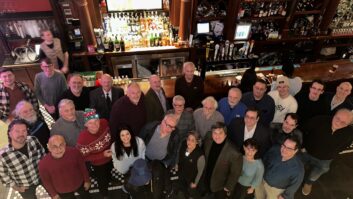One of the longest running shows in radio history has just completed its latest season in Hope, Ark., playing to a full audience.
That program, “The KXAR Lions Club Christmas Auction,” has been broadcast continuously since 1950, and is deeply rooted in this small community. It’s been heard by at least three generations of southwest Arkansans and the station originating it now operates under its fourth set of owners.

Hope (Ark.) Lions Club President Dave Phillips, right, describes an item while auctioneer Ed Flagg waits to take bids at the 59th annual Hope Lions Club Christmas auction. The live program still draws as much or more community interest and audience as it did when on an early December evening 59 years ago, station manager Luther (L.B.) Tooley stepped up to the one of the station’s RCA 74 ribbon microphones and announced that the Lions Club Christmas Auction was on the air.
Admittedly, the show has a somewhat short season, a three-night run during the first week of December. But even after nearly six decades it still manages to maintain a high degree of popularity and audience participation.
Holiday spirit
The radio auction has its basis in the Christmas spirit of giving and helping others. Beginning early each November, local Lions Club members canvass town merchants for merchandise and services — and more recently, gift certificates — to be auctioned off to the highest bidders. All services are donated, including air time, with the money raised going toward the purchase of food baskets to be distributed to the community’s needy at Christmas.
“This year we raised around $25,000, which is not too bad considering the economy,” said Mark Keith, director of Hope’s Chamber of Commerce, and also sign-on man at KXAR. “We’ve identified about 125 families in need of a little something to make their Christmases a little brighter.”
KXAR celebrated its 61st birthday on Dec. 12 and has provided time for the broadcasts since the idea for the fund raiser originated. Originally, the auction was conducted in the station’s studio, but within a few years had outgrown that space and became a “remote” broadcast. It moved to venues all over this community — from an old opera house building, to the city hall auditorium, and even a court room, before settling in a decade or so ago at the coliseum building at a town park.
Even the influx of television in the 1950s and beyond hasn’t really affected the show’s popularity.
“People have just been turning off their television sets and turning on the radio during this one special week of the year,” said Keith. “We have a low-power TV station here now and they’ve been covering the auction too, but we find that people still listen in on their car radios, and once they hear what’s going on want to get involved and they drive on out to Fair Park and the auction site.”
A battery of volunteer telephone operators take bids from those who don’t attend in person and according to Keith, they are kept quite busy.
Do I hear $75 to put this goat in Judge Brown’s front yard?
The auction hasn’t always been strictly about goods and services.
At one point in its run, it became popular to bid on the installation of goats, sheep or other livestock in the front yards of prominent townspeople. After the bidding was finished and arrangements had been made to tether a certain animal on the lawn of an elected official, automobile dealership owner, or other businessperson, another auction would immediately follow to allow the “victim” to block the animal’s visit and have the critter ensconced on someone else’s property.
The yearly broadcast also became a means for local musical talent to add radio appearances to their résumés, as acts were staged to give auctioneers a break and to entice even more area residents to tune in to hear their friends and family members perform.
“It’s just been a lot of fun over the years,” Keith said. “And it’s all in the spirit of helping the needy. In this day and age of TV, video games and the Internet it’s good to see people put these aside for a little while and come together as a community.”
Keith, who’s also something of a radio historian, said that to his knowledge only the “Grand Ole Opry” and the “Ernest Tubb Midnight Jamboree,” which run on Nashville’s WSM(AM) and started in 1925 and 1947 respectively, can top the “KXAR Lions Club Christmas Auction” for having the longest continuous run time.
The author is a frequent contributor to Radio World.












